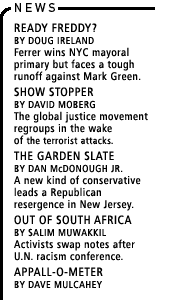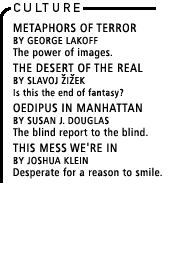|
|

|

|

|
|
|
| |
|
|
|
The following edited transcript is excerpted from an interview with Studs Terkel recorded for 848, a radio show on Chicago's WBEZ. Over the years, we've heard scores of Studs Terkel's conversations
gathering the thoughts and experiences of others. But this time,
we wanted to hear Studs' own reactions and analysis of the tragic
events of September 11. How do you feel about comparisons made between what happened
and the World War II bombing of Pearl Harbor? We still think in those old terms of wars, of boundaries, of us as the righteous ones. When we bomb people, it's for the good of the world and for the good of themselves. And he said unless we think anew, peace is indivisible. What happens in Guatemala or in the Middle East affects us. It hasn't really affected us as persons. Shortly after the bombings, we were on the 55th floor of Bank One [in Chicago]. My son had to see a lawyer. And we were practically the only ones on the floor. And all I saw were these long corridors, empty—it was out of a Bergman film, surreal. And down below, all the people, all crowded, all jamming, all going home. They just wanted to go home. As though they were refugees. We see refugees. It has no effect on us. We're used to them, there—the distant country, but not us. And now the lesson to be learned is that peace is indivisible. One of the things that Bush has said, I'm paraphrasing now,
"It's very black or white. There is a good guy and a bad guy. We've
got to get the bad guys." Do you think that's a simplification? Who are the bad guys? They are obviously nutty, loony, vile individuals. Massive retaliation, is that it? Should we bomb Iraq (as we've been doing, by the way)? Who do we bomb? Do we bomb the Afghans? They were our allies, by the way. They were our heroes during the Cold War. ... Who do we bomb? Who do we hit? Are we so hungry to hit somebody rather than face the situation? What caused the situation to enable these madmen to do what they did? What do you think a 20-year-old today might think about
this compared to how you felt as a young man when America was engaged
in World War II? So how will this series of tragic incidents affect the American
spirit? Copyright 2001 WBEZ Alliance Inc.
|




